LINDEN DELIGHT
Big deal at Little Deli, where everything is made from scratch
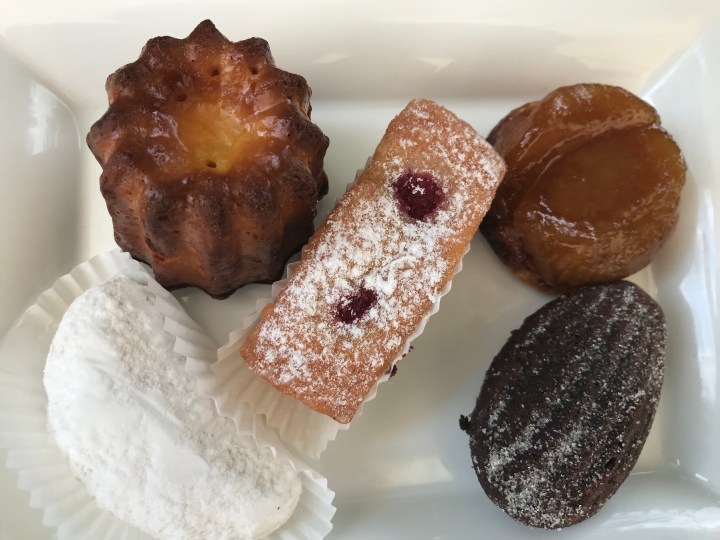
A small deli in Linden slices into customer satisfaction with a kitchen that makes everything – from charcuterie to bread – that it sells.
There are more products in Linden’s Little Deli that were born and invented in more international and national places, of course. Most of them are either charcuterie of the most sustainable kind or patisserie of the most beautiful sort. They’re all made at the Little Deli, this house with an inviting garden. The major part of the building is dedicated to being the kitchen, with a front deli shop up a short flight of steps from the garden.
All these Little Deli products really are fully made from scratch.
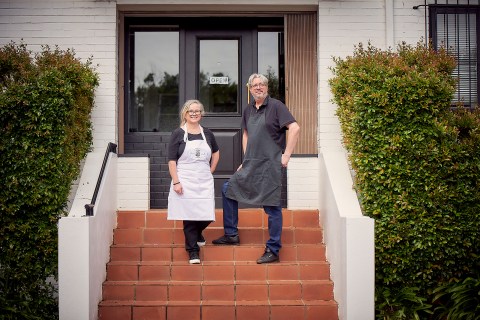
Little Deli’s owner-workers, Carina and Andrew Johnson, in front of their deli that has the real works behind it. (Photo: Neil Kirby)
“That’s the thing most people can’t believe at first,” Andrew Johnson says. He and his wife, Carina own and work the place. “If people don’t believe it or can’t understand it I give them tastes. Sustainable, naturally produced products have such an unmissably different taste.”
I smile. It’s so true. I’ve been wonderfully fortunate, finding this out, confirming it here and elsewhere. How did we, for the sake of quick-and-easy “convenience” and mass “farming”, even believing that ‘unfood’ was cheaper, move so far from real food for so long?
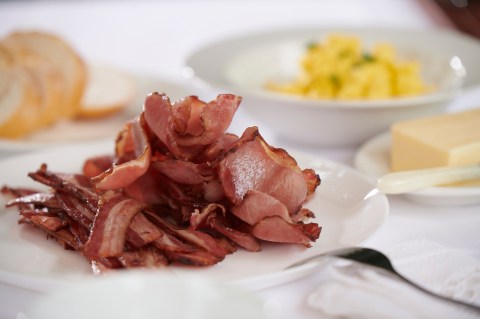
How did we move so far from real food for so long? (Photo: Neil Kirby)
Yes, everything here: the real no-chemical bacons of various kinds, the bangers, sausages of so many varieties, the highly desirable pork pies and Scotch eggs, the ham, the ragu sauces, all come from the butchery and kitchen on the premises, where the carcasses are cut, meats sliced, ground, steamed, smoked, cured, naturally dried in various ways for the most trusted results.
Today I’m determined to have a sandwich made that I’ve noticed other people eating before. The garden is filling up and I trot up to the deli and order that delicious-looking pastrami on pretzel, with excellent coffee.
It suddenly occurs to me that pastrami is, of course, beef and not pork. Does Andrew make pastrami too? I thought he received pork carcasses. I wrote about the nose-to-tail business in Jozi once and that featured his neck-to-tail pork (see Tripe trotters in Joburg). I didn’t know there was any beef as well. And haven’t I seen chicken products, maybe even whole ones, in the fridges? I’m usually concentrating on the bacon and salsiccia but I’m sure I’ve seen other meats. The ragu probably features pork and beef, come to think of it. I know there are free range eggs in this shop. And, of course, this is where I get duck eggs. What’s the story there?
Andrew is adamant about having no middlemen between his butchery and the farmers themselves. He’s selected the latter for their dedication to natural, hormone and antibiotic free rearing and uncontained, outdoor conditions. They are small farmers, not necessarily with the big funds for organic certifications but who keep to sustainable and natural ways out of their love and belief in those old ways. The pork farmer travels for five hours from his farm in the Schweizer-Reneke area of North West to Andrew because that is his buyer of natural meat. He sets off at dawn with a thermos and another to return, once every week. He is the one who also brings my duck eggs to the Little Deli, also from his farm.
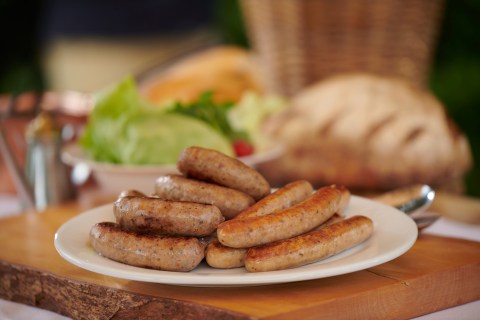
The pork farmer travels five hours from his farm. (Photo: Neil Kirby)
Although there are a couple of other good pig farmers, as in Rustenburg, they supply agents in one case and the farmer’s own restaurants in another. Those would be chef James Diack’s three Parktown North restaurants. The Schweizer-Reneke farmer is the closest pig farmer from whom Andrew is happy to buy, who farms with the land and animal-care ethics Andrew shares and encourages.
The same ethical considerations are shared by his Dexter beef farmer, much closer by. So, yes there is one supplying him, for more than the pastrami. The chicken farmer, originally a Zimbabwean in Limpopo province, has been breeding and supplying Andrew with free ranging, pasture-mobile, southern African chickens from Venda, Ovambo and Matabele chickens. They have no need of chemical interference and protection from disease or to encourage unnatural growth.
Andrew keeps some at his house and says they are “the first friendly chickens” he’s encountered. It makes sense to me, having hung out with some Matabele chickens once before, when visiting the artist Esther Mahlangu. Their feathers were also vital to her artwork as paintbrushes of a sort.
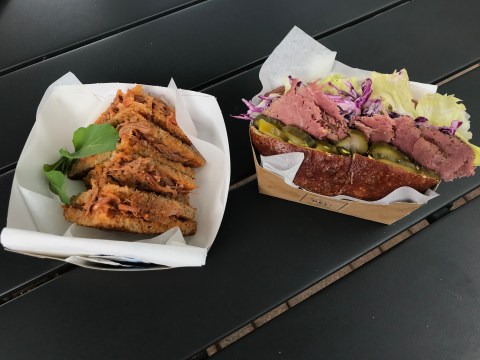
My happy day of eating: a toasted rye pork shank ragu sandwich and my pastrami pretzel roll. (Photo: Marie-Lais Emond)
My happy day of eating a Little Deli pastrami roll is improved by a friend joining me for a toasted rye pork shank ragu sandwich. We do a little cardboard container swapping and some tasting of a couple of the patisserie items, including a madeleine, somehow still special, even long after having made many careful batches of Proust-inspired ones with a cooking friend, on reading Swann’s Way, the first volume of Remembrance of Things Past.
The other patisserie item on this table today, next to the madeleine, is a little and luscious tarte tatin. Supposedly first created on purpose or by mistake, the caramelised apple tart was produced by the two sisters after whom the tarte Tatin was named. The Tatin part of the name, not the tarte.

Next to the madeleine, a little and luscious tarte tatin. (Photo: Marie-Lais Emond)
Every Parisian-famous, buttery, almondy financier and every canelé has been sold today. I am particularly fond of the latter Burgundian custardy flutes. The Parktown North branch of now-gone Patachou seemed like a particularly lovely spot to me for being able to have one there every time I had a cup of coffee. That is until I found them at the Little Deli one day.
Chef Carina Johnson is responsible for my latter addiction. She and her sister, in matching matelot stripes, are arranging turns of children minding. I sit with them and then just Carina in the cool and pretty garden, under olive trees, surrounded by blue agapanthus. A canelé is her favourite piece of patisserie too, more the making of than the eating of, on her side of the business. In the product’s absence today we discuss the very detail that makes them so maddeningly special. It’s the charming crisp edge.
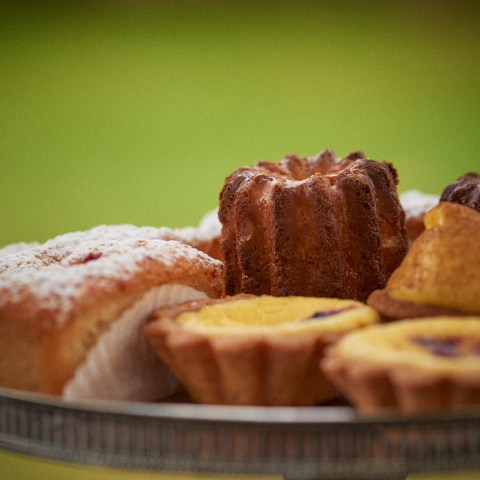
A provocative canelé, followed by a financier, a tarte tatin, chocolate madeleine and kourabiede, clockwise. (Photo: Marie-Lais Emond)
A couple of days ago I read a useful piece of advice for the canelé glutton. If you want to buy lots of them and, generally, they can be had from Carina here or online in boxes of a dozen, in that case. The advice is to freeze the ones not immediately gobbled because, oddly enough, that crispy edge is retained on bringing them back to room temperature, not mushed and softened as one would imagine. There is no proof of this patisserie advice this day, I fear.
Chef Carina’s canelés are quietly bought by some remarkably well-known patissiers in Jozi, maybe not surprisingly.
Carina trained in French patisserie at the Cordon Bleu Cookery School when it was here in Jozi, in Kew. She’d backpacked Europe and England, first meeting Andrew there and then again back in South Africa. Meantime, Carina naturally welcomed the chance to show her patisserie worth and to do the cold kitchen at Franschhoek’s Le Quartier Francais.
Andrew had been at boarding school in Northampton earlier, when his favourite grandmother had introduced him to pie making and eating. The area just happens to be famous for its Mowbray pork pies. The taste for them stayed with him all through doing a degree in microbiology. Even during those student years, Andrew was a junior foodie, saving up to eat out at famous restaurants rather than buying clothes or other entertainment.
He doesn’t even smile when I ask if microbiology has had any influence on his final career choice, as a deli butcher. Instead, Andrew says it taught him how to be methodical, to keep records, how to research and be organised, above anything else.
He went on a short charcuterie course involving Neil Jewel, in Franschhoek. “What it did was demystify this possible project. I realised, I can do this!” Then he did, by teaching himself about butchery and charcuterie online.
His science degree also taught Andrew to be focused. “It was never the idea to run a restaurant. It still isn’t and it won’t become one,” he states. However, he was advised, nagged, to have coffees for people and let them sit in the front garden.
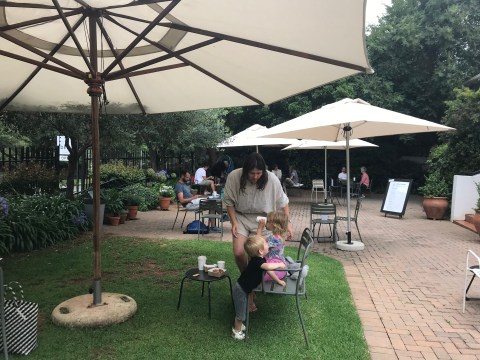
People sitting in the pretty garden select what they want from the shop up the steps. (Photo: Marie-Lais Emond)
So he did a barista course. That’s what Andrew is like. He has a real barista in his employ now but he had first to know about it, himself. Or at least to know what he didn’t know. There is no table service in the Little Deli garden. There are no tables indoors. People sitting outside select what they want from the shop up the steps. It’s brought out in sustainably kind take-away packaging and, when you’ve finished, there are bins into which to tip the packaging.
But it is a deli after all. You take stuff away a bit more than you sit here and eat it. I watch a high heeled, fashionable sort of woman swinging many big brown carrier bags down the path, out through the gates, presumably to her car. She has that air of just having bought a wealth of clothes at Hyde Park. People cluster in the shop, both to look at the wall menu and to help themselves to supplies from the many fridges.
Carina also has a section where she buys in “the very interesting” goods on a few shelves. I see she stocks fascinating Rex Union marmalades (See here: A fruitful union of old citrus groves among them.
Linden once had a crocheted doily sort of image. Today, as Andrew says, it’s changed. It’s a little more expensive as a suburb and it attracts young professionals.

Chef Carina Johnson stocks ‘the very interesting’ goods. (Photo: Marie-Lais Emond)
These are the people who travel, who love to eat internationally inspired charcuterie and patisserie, the products that the Little Deli makes from scratch and sells.
“The funny thing though,” says Carina “is that people around here, actually people in South Africa generally – and I’m from this area – don’t eat cake during the week. For some reason people see it as a weekend-only thing.” She smiles and shrugs.
“The most rewarding thing,” says Andrew, “is that even very local people are now starting to demand and be relieved to get from us responsible and ethically farmed and produced foods. It makes me very happy.” DM/TGIFood
The Little Deli, 47, 4th Avenue, Linden. 011 782 1350 @The_Little_Deli_Linden
Follow Marie-Lais Emond on Instagram Marie-Lais Emond.
The writer supports Nosh Food Rescue, an NGO that helps Jozi feeding schemes with food ‘rescued’ from the food chain. Please support them here.





 Become an Insider
Become an Insider
Comments - Please login in order to comment.